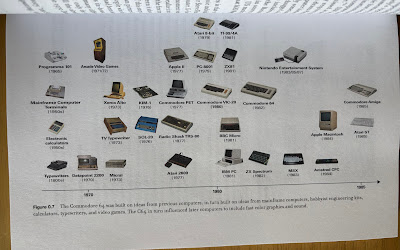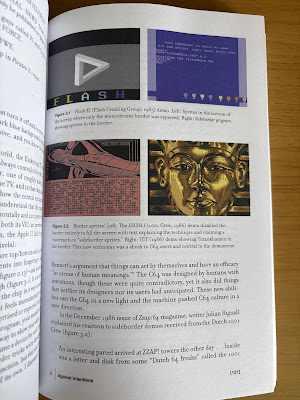Subtitled "The Five Lives of the Commodore 64 Computer", Too Much Fun has, in my humble opinion, one of the finest introductions to any reference work for either a specific format or a general history of computing. Why? Because the author states clearly and concisely from the very beginning that the US-centric history of "video games" is extremely narrow, and most definitely NOT what the accepted history of video games (console and computer-based) should be defined as.
Indeed, it's only been a few months as I write this since there was a bit of a kerfuffle about video games "history" and the approach taken by rather too many social media peeps in that the US crash of 1983 is revered as a turning point in video games history, permitting our Lord and Saviour Nintendo to deliver us from boredom. And I'm not even getting into the computer vs video gaming nomenclature argument, because if you stick to the latter as meaning home consoles only, then the home computing scene pretty much never existed. As I may have said in many non-professional (and in some professional) settings, what absolute complete and utter bollocks. And here is Mr Juul's finely written tome to help prove it.
Oh, this isn't a format thing, and I'll tell you it pleased be no end to see the Olivetti Programma 101 referenced in a very early infographic, but it needs to be recognised by all that just because you experienced events from your cultural viewpoint, that doesn't mean to say it was the only perspective. Just check out Lewis Packwood's Curious Video Games Machines! With this MIT publication, the author brings a highly focussed look at where the influential Commodore 64's origins, how it succeeded, how it maintained its popularity, and how it became, and continues to be, a legend in home computing. And for games.
The Five Lives of the C64 have space to breathe, with the first chapter giving us a narrative explaining where the C64 came from and how it did what it did - for the time, an impressive machine. The second moves onto the gaming side of the computer's life, and how it captured the hearts of those fortunate enough to experience it (all the more so if you had a disk drive - even one as slow as the 1541!). That being said, my first home computer was an Amstrad CPC 464 and I absolutely loved that micro. Didn't mean I wasn't envious when I saw some of the other computers my friends had - different games for different formats, but as a ten year old, receiving the mono-screened majesty of the CPC was a moment of joy. Then it went into the loft when I acquired an Amiga. Oh well...
The author moves onto the demo scene in chapter three, and how both individuals and groups managed to stretch the capabilities of Commodore's stand out micro far beyond the expectations of its original creators. I only really got into experiencing the output of demo groups when I had the aforementioned Amiga, but having had a look about the author's website (https://www.jesperjuul.net/c64/ - and frequently referenced within the text), I now have a much greater understanding of the 8-bit's wonder.
The fourth section details the efforts to keep the C64 relevant, and that means GEOS - quite the achievement for a 6502-powered machine. I will, however, dock Mr Juul a half point from this blog's non-existent review scoring system for not mentioning RISC OS in his list of GUI's on page 160. I'm not angry, just... disappointed... ;-)
The final chapter deals with the legacy of the C64 and the how and why it has become a highly appreciated retro system today, before wrapping up the text with a fitting lesson for a conclusion. Throughout, there are quotes, interviews and personal reminiscences that add much flavour and detail to the subject.
The book ends, as it should, with a highly useful bibliography, and having a scan through the tomes listed, I have to say I own quite a few of them. Yes, there will be a review of TOO BLUE! in the forthcoming weeks, because oh boy, there's things that need saying...
Anyways...
One of the joys of reading about the history of gaming is expanding my knowledge. As a UK bod, I'm much more familiar with that market and its history (as well as having been playing games since the early 1980's), so by extension, my knowledge of other country's gaming past is naturally going to be patchy until I get to read more about it. This knowledge base is not a reason for me to dictate that events in the UK have a greater importance than those in other countries. Far from it. Instead, it's a reason to learn about those other markets, the hardware, the software and the people behind them, and that's what this book does for a very specific subject, and it does it bloody well.
The dominance of the US-centric history or gaming (video/computer/whatever) is not a good thing. Yes, it should be acknowledged as a huge market, and a highly influential one, but it was not the be all and end all (see Mr Packwood, for example, or Jamie Lendino's fine ST tome, Faster Than Light). Too Much Fun is a marvellous example of this being highlighted and providing a thoughtful and illuminating history of a computing format that, if we were to subscribe to the seemingly "orthodox" view, died after the excruciating US 8-bit price war of the early 1980's. A war that console "video games" history would have you believe never actually occurred. It did, and to find out what happened next to the C64, this book will serve you well.
You can check out the author's website here where you'll find details on this and his previous books. You can pick up this book from the usual online stores (also listed on the author's website), and I'm sure you'll be able to order it in to your local bookshops as well. You won't be disappointed if you do.






No comments:
Post a Comment